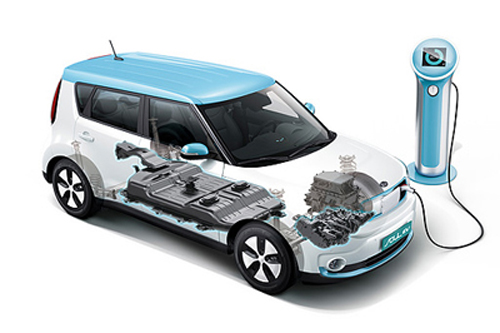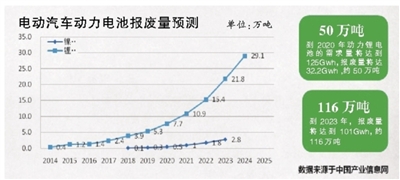
In the past two years, the development momentum of new energy vehicles has been rapid. Globally, in 2015, global sales of new energy vehicles were 528,000 units, and in 2016 it was 770,000 units, which represented a year-on-year growth rate of 42%. By 2020, sales volume will reach 3 million units, or even higher.
China has become the largest country in promoting new energy vehicles. In 2016, the sales of new energy vehicles in China reached 507,000 vehicles. It is expected that the sales of new energy vehicles in China will reach 700,000 units this year. According to the new energy vehicle development plan, the production and sales of new energy vehicles will reach 2 million by 2020, and the number of new energy vehicles will reach 5 million by that time.

With the development of new energy vehicles, an issue that cannot be ignored has attracted more attention. Some battery batteries have entered the retirement period, and the recycling of used power batteries is imminent. Some studies predict that by 2020 the amount of power lithium battery scrap will reach 32.2Gwh, about 500,000 tons, and by 2023, the scrap will reach 101Gwh, about 1.16 million tons.
Faced with this new phenomenon and new problems in recycling, it is necessary to draw lessons from the recovery system of foreign power batteries to speed up the construction of a domestic battery recycling system.
Analysis of foreign power battery recycling system
Japan has been at the forefront of recycling waste batteries. Since October 1994, Japanese battery manufacturers have adopted a battery recycling program to establish a battery recycling system of “battery production-sales-recycling-recyclingâ€. This recycling system is based on the voluntary efforts of each manufacturer. Retailers, car dealers, and gas stations collect waste batteries from consumers for free, and they are eventually dismantled by recycling companies.
At the same time, since 2000, the Japanese government has stipulated that manufacturers are responsible for the recovery of nickel metal hydride and lithium batteries, and based on resource recovery, product-oriented design; after the battery is recovered, it is transported back to the battery manufacturer for processing, and the government grants subsidies to the manufacturer. .
In addition, the Japanese government has also formulated a series of laws and regulations to regulate the recycling of waste batteries. For example, the Basic Law is the Basic Law for Promoting the Establishment of a Recycling Society, and comprehensive laws, including the Solid Waste Management and Public Cleaning Law, and the effective use of resources. Promotion Law "Energy Conservation Law", "Renewable Resources Law", etc.; Special Laws, including special regulations based on the nature of various products.
In the United States, the recovery of waste batteries is mainly based on market regulation. The government administers environmental protection standards to restrict the management of waste batteries. Waste battery legislation involves federal, state, and local levels. Among them, the "Resource Protection and Recycling Law," "Clean Air Law," and "Clean Water Law" adopt a license management approach from the perspective of federal regulations to strengthen the use of battery manufacturers and used batteries. Resource recovery and utilization of corporate supervision. The "Manganese-containing Battery and Rechargeable Battery Management Law" mainly proposes corresponding technical specifications for the production, collection, transportation, storage, and other processes of used secondary batteries, and at the same time clarifies the labeling regulations that are conducive to later recycling. Lithium-ion battery products are covered in product management legislation in New York and California, requiring manufacturers to develop battery collection and recycling programs without sacrificing the interests of consumers and retailers.
In terms of the recycling system, the battery association has established a deposit system; the government establishes a battery recycling network, uses additional environmental fees, and co-finances the consumer and the battery manufacturer as support for the government's recycling funds; the waste battery recycling companies will purify at the agreed price. The raw materials are sold to battery manufacturers.
Since February 1, 2010, the United Kingdom has officially implemented a new regulation for battery recycling in the EU: Stores that require more than 32 kilograms of battery sales annually must be responsible for recycling used batteries. The regulations state that battery manufacturers should shoulder the primary responsibility for achieving recycling goals.
Since 2009, the "Battery Law" has come into force in Germany. According to these laws, merchants selling batteries in Germany must set up battery recycling points. Recycling bins must be emptied at least once a week and transferred to recycling plants. Battery manufacturers and importers must be registered with the government and dealers should reclaim abandoned portable batteries or batteries for free.
The German government has legislated for recycling, and producers have assumed the main responsibility. They have used the fund and deposit mechanism to establish the marketization of waste battery recycling systems and achieved good results. Battery manufacturers are responsible for the collection, disposal, and recycling of waste batteries. Producers and users of industrial batteries can stipulate the burden of funds through agreements. The user is obligated to hand over used batteries to designated recycling agencies.
It is worth mentioning that Germany established the Common Recovery System Foundation GRS in 1998. Battery companies pay management fees according to their market share, weight and type of batteries, and can share the foundation's recycling network. The GRS Foundation began to recycle industrial batteries in 2010 and continues to expand the recycling map as the development of the energy storage industry.
On the whole, foreign battery recycling industry is mainly based on market regulation, supplemented by government constraints, and laws are an important guarantee for preventing and controlling battery pollution and recycling. Developed countries have fully implemented the "extended producer responsibility" system by establishing and improving a sound legal mechanism, and then used legal force to stipulate various links and constrain all related entities of the entire battery life cycle so that they must assume responsibility in accordance with the law. To fulfill its obligations and impose severe penalties on those who violate the law and improve the recycling system.
Domestic power battery recycling system
In 2012, the State Council's "Energy Conservation and New Energy Vehicle Industry Development Plan (2012-2020)" stipulated that the use of power battery cascades and recycling management should be strengthened. Formulate power battery recycling management methods, establish a power battery cascade utilization and recovery management system, and clarify the responsibilities, rights, and obligations of all related parties.
In July 2014, the “Guiding Opinion of the General Office of the State Council on Accelerating the Popularization and Application of New Energy Vehicles†stated that it is necessary to study and formulate policies for the recycling and utilization of power batteries, explore the use of funds, deposits, and mandatory recycling to promote the recovery of waste power batteries and establish sound waste Power battery recycling system.
Since 2016, the Ministry of Industry and Information Technology has successively issued the "Policy Recycling and Utilization Technology Policy for Electric Vehicles (2015 Edition)", "The Regulatory Conditions for the Comprehensive Utilization of Waste Power Battery for New Energy Vehicles," and "Interim Measures for the Administration of the Regulatory Announcement of the Comprehensive Utilization of Waste and Power Battery for New Energy Vehicles". The three documents clarify the main responsibility for the recycling of used batteries and strengthen supervision of industry management and recycling.
China's power battery recycling system has been continuously improved. Although the main responsibility for power battery recycling has been clarified, various cities have also actively explored battery recycling policies. However, there are far-reaching gaps in implementation and there are shortcomings in the system.
First, there is a lack of targeted laws. The regulations governing the recycling of waste batteries are mainly the departmental regulations and guidance documents issued by the Ministry of Environmental Protection, etc., which are only principles. Second, there is no clear responsibility. The relevant laws and regulations have a low level of effectiveness and are very fragmented. There are no mandatory measures to ensure that battery manufacturers assume responsibility for recycling. Third, the recycling system is incomplete. A large number of waste batteries flow into informal channels, and non-regular recycling companies have cost advantages, making formal recycling companies face material shortage.
Power battery recycling is a complex and mutually restrictive industry, and its development requires the convergence of multiple parties to form a positive interaction cycle, in order to promote the rapid development of the industry. In this regard, the establishment of domestic power battery recycling system, the proposal can be carried out from four aspects.
First, the deposit and awards parallel system. On the one hand, the awareness of consumer power battery recycling is cultivated, and on the other hand, the enthusiasm of enterprises and consumers is enhanced. Second, the layout of recycling outlets. Automobile manufacturing companies, battery manufacturers, recycling and dismantling companies, and comprehensively-utilized companies cooperate in building and sharing waste battery recycling outlets in various forms. Third, the transfer of harmless treatment costs. The collection of additional environmental fees will transfer the cost of recycling to automobile manufacturers, battery manufacturers, and consumers. Fourth, manufacturers should design products based on resource recycling. Battery manufacturers should consider the convenience of recycling and environmental protection when designing products.
Solar Dc Inverter Air Conditioner
Solar Dc Inverter Air Conditioner,Solar Air Conditioner,Inverter Air Conditioner,Solar Powered Air Conditioner
Yinchuan Aini Industry And Technology CO.,ltd , https://www.aini-heat.com